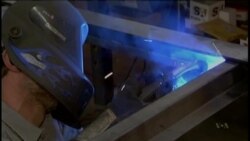Friday’s closely watched report on the U.S. job market saw the economy gain 248,000 jobs in September. Combined with an upward revision of 69,000 more jobs in previous months - the nation’s unemployment rate fell to a six-year low of 5.9 percent.
Both figures were stronger than most economists had predicted. But It also could encourage the U.S. central bank to raise interest rates sooner than many expected.
A burst of hiring in September helped push the U.S. unemployment rate to its lowest level since July 2008. Along with upward revisions in July and August, Chief Investment Officer Brad McMillan at Commonwealth Financial Network says the economy is clearly moving in the right direction. He spoke to us on Skype.
“What you have to look at is the trend, and what we’ve seen with the exception of last month - we’ve seen over 200K [200,000] for a number of months in a row and that’s something that hasn’t happened since the 90’s,” said McMillan.
Job gains were broad based - with new hires in the construction and manufacturing sectors - and better than expected growth, 81,000 new jobs, in professional services. That’s an important distinction, according to Bankrate.com senior analyst Greg McBride - on Skype.
“Most importantly, the types of jobs that are being added this year are better quality jobs than what we had seen in each of the previous years," said McBride. "The leading category for job growth here in 2014 is professional and business services, so these tend to be higher paying jobs.”
Stagnant wage growth has been a drag on consumer spending since the recession ended. But rising wages and the steady pickup in jobs could have a downside - especially if you’re looking to get a loan.
McMillan said that’s because a rapidly-improving economy could sway the U.S. central bank into raising short-term interest rates sooner than many expected.
“I’ve been saying for a long time: I think the bias on the Fed is actually towards sooner and faster tightening than the market is taking into account, and I think those numbers [job report] make a March [2015] increase much more likely,” he said.
The Federal Reserve has slashed interest rates since the recession in an effort to stimulate business spending and boost employment. But some economists say low interest rates coupled with an improving economy could fuel higher inflation, which would have the opposite effect of slowing economic growth.





